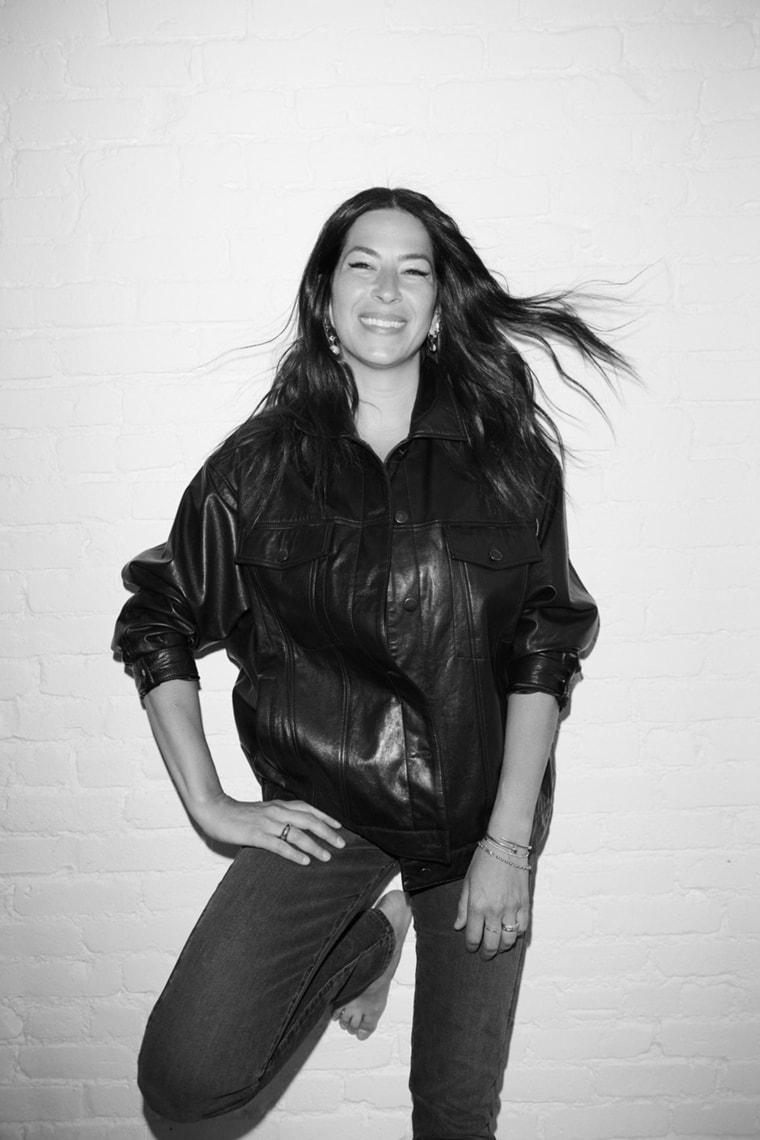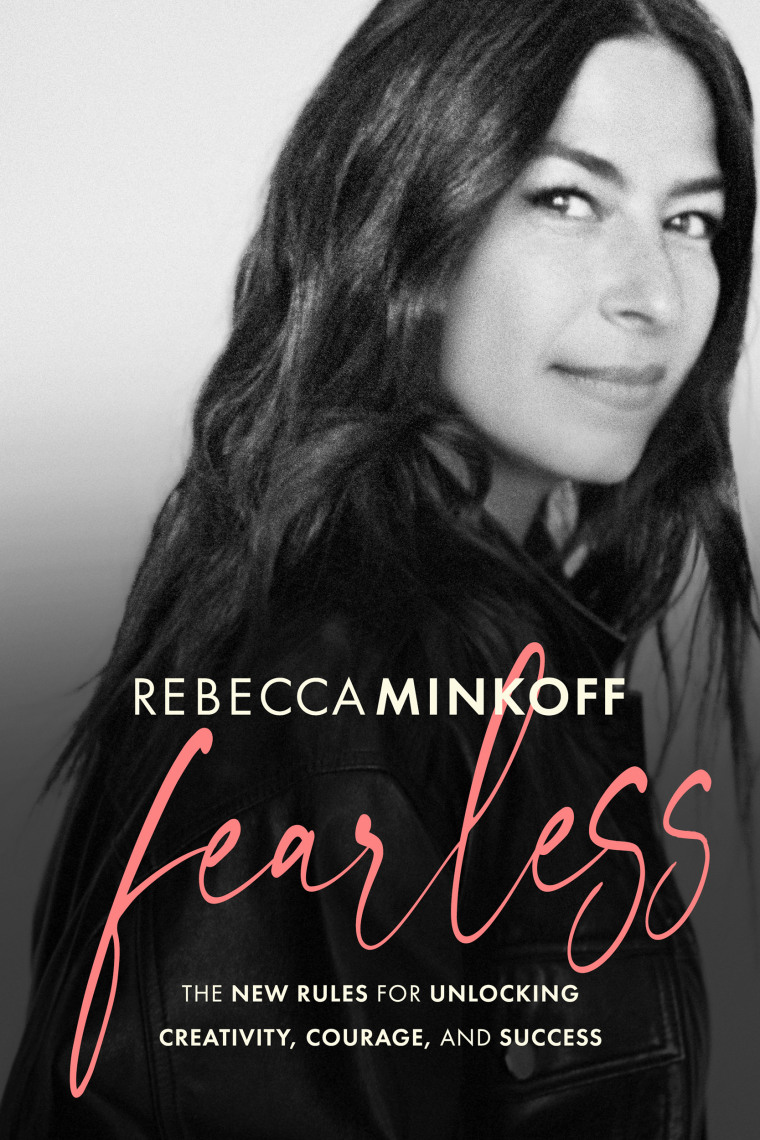We are all works in progress; even the successful women you see owning it on Instagram faced stumbling blocks along the way and continue to work hard to stay at the top of their game. In this series, we're sitting down with the people that inspire us to find out: How'd they do it? And what is success really like? This is "Getting There."
Rebecca Minkoff moved to New York City at 18 years old and immediately started her own business after she was fired from her first fashion job, using $10,000 in savings to create her first clothing line and a set of lookbooks. The risk was huge, and almost didn't pay off — Minkoff only received one call about the line and had to repurpose the fabric into clothing that was sold on consignment.
More than two decades later, Minkoff is a top designer with dozens of hit collections under her belt a new book about her journey to the top. She told TMRW that she's never let go of that scrappy, can-do attitude that led to her early success.
TMRW: What was your very first job?
Rebecca Minkoff: I don't want to sound trite ... but in my house, we never got anything handed to us. We had to work for what we wanted, and so my first sewing machine was something I desperately wanted and my mom was like, "I'm not paying for it." And so I had to essentially babysit for an entire summer to get it, but once I had it, that's all I did with my free time.

TMRW: Do you think that there's a specific moment that set you on the path to end up where you are today?
Rebecca Minkoff: I don't think I could ever attribute it to one moment; I think it's a series of moments and a series of decisions. When I got fired from a design company (early in my career) with no money and basically nowhere to live, you know, an appropriate response probably would have been like, "I'm going to move home and figure something out."
Instead, I was like, "No, I'm sticking this out and I'll work it out. I'll sleep on couches or become a bartender in order to stick around." I think that in life, you're going to need that type of resolve, especially when it comes to your career. And so I think that moment of like, "No, this is the first challenge of many that I'm going to encounter, and I'm here to stay," was definitely a pivotal experience for me.
TMRW: Can I ask what that period was like, that era of trying to make it work despite setbacks?
Rebecca Minkoff: It was a mixture of "I can't believe this is my life" — my parents were treating me like a fallen human, like, "Hey, you loser drug addict, come home," that was kind of their thing, even though I was not a drug addict, but I felt like they were talking to me as if I was — and this revolve of "I've got to stick this out, I have to figure it out, I will figure it out. Let me deploy every tool in my small toolbox to get to the next level." It was a weird mixture of stubbornness, naiveté, bullheadedness and perseverance.
TMRW: How did your career led to you writing your book, "Fearless: The New Rules for Unlocking Creativity, Courage, and Success?"
Rebecca Minkoff: What inspired the idea to write a book was a colleague of mine, a woman who's an incredible bestselling author. We were sharing a cab and she said to me: "You should write a book." And I said, "About what?" I was like, "I'm not going to do some handbook on the history of bags or a coffee table book, that just sounds terrible." And she was like, "You have 20 years of hard-won knowledge, 15 years of it being your own company. That's valuable, and that could be really helpful to people."
I was like, "Oh, yeah, I guess I could help people." And so I thought if I could take all of my lessons, all of my learning, and that could help someone else and allow them to sort of know that fear is going to be part of this equation but it doesn't have to control you when it comes to your passion and your career, I think that was how I felt I could be the most helpful. Obviously, I wanted to tell them in an engaging, fun way that you'd be entertained as well, so it's not like a business book where it's dry. It's full of these cringeworthy moments that make it real, because that's life.

TMRW: You wrote a lot of the book during the pandemic. What was that like?
Rebecca Minkoff: The outline and framing was all done pre-pandemic, but the nitty-gritty writing was during the pandemic. What was interesting was as my business was falling apart — we lost 70% of our business essentially overnight — I was here writing about how I got up and got to that point. It was just a good reminder of what I did in the beginning that I was going to have to replicate again in order to come out of the pandemic.
TMRW: Is there any particular lesson or anything that you learned early in your career that's been really helpful for this situation?
Rebecca Minkoff: It can't be overstated enough the scrappiness that is needed as an entrepreneur and the ability to problem solve and being willing to try things. I think so many people are afraid of failure, and during the pandemic especially we just said, "All bets are off. Let's try it all." So whether it was me creating all the content or how we marketed to customers using new technology, like text message programs. ... We were just constantly trying to find ways to really truly communicate to customers, not as a brand, but as a human who has brands.
I also think, during the first couple months, people were like, "I don't want to look like I'm trying to sell something during a pandemic, and I just kept saying, "You know what? If we all go away and fail, then America doesn't have an economy. We have to be there, we have to sell our products. We're employing humans. We're helping them feed their families. And so we've got to stick around."
TMRW: Going back to the book, do you think your rules for working in your industry or building your career vary from conventional wisdom? How so?
Rebecca Minkoff: There's a chapter in the book called "Unfollow: Break from the Pack and Go Your Own Way." You know, that was almost the book title but my publisher felt like that had negative connotations, but I really feel like now, more than ever, we are in the Wild West of business. There's no perfect way to do something. What got someone else to their success might not be how you get yours. I want to encourage people to think outside of the box, to take risks. That's one of the main tenets of the book. Here are the rules that I think you should have as your base, and then from there go create your own canvas and stop worrying about how everyone else did something.
TMRW: Say someone read your book and takes away just one lesson. What would you want it to be?
Rebecca Minkoff: I think the most important lesson is that, again, we have to reframe the idea of failure and taking a risk ... In life, companies are constantly innovating. You're always getting a new iPhone update. No one's sitting there at Apple thinking, "Man, we failed on that last update. It wasn't perfect." They're like "Sorry, another bug." I think if you could take that approach throughout your career and take risk, as long as you're not betting the farm, if you fail, think about with you learned from it.
For me, now, risks are not a source of fear. They're a source of excitement, because I know if it doesn't go the way I want I will definitely have learned a lesson, and that's probably my most important advice.
TMRW: I was reading an excerpt from your book where you mentioned that success isn't about the boats and the fancy cars and the things. I was just wondering if there was ever a splurge or a purchase you made that for you marks the moment that you "made it."
Rebecca Minkoff: When I signed my book deal, I was invited to this fancy Tupperware-style party for this jewelry designer that I love. I was like "This is too much money. I shouldn't do this." And then I was like, "You know what? I just wrote a proposal that got me a goddamn book deal. I'm buying myself this nice bracelet that makes me want to vomit at the price tag." I think that was the moment.
TMRW: Looking back at your career, is there a piece of advice you would give your younger self?
Rebecca Minkoff: There were so many moments where I didn't let fear hold me back, but I let myself experience fear and I would pursue that risk anyway, but with a lot of "Oh, should I have done this?" or "Why did I do that?" You know, kind of a close your eyes and grit your teeth moment.
We had a consultant many years ago point out to us all these different moments when, as a company, we took risks, whether it was talking to our customer before anyone did, working with influencers before anyone did ... He was like "What are you scared of? Every time you've done this you succeed, and every time you follow the pack and try to do what everyone else does you lose." And I was like "Oh my God, he's right. Why was I scared all those times? I should have just plowed even stronger in that direction."
And so that's what I would tell myself. "Don't get a grey hair over this. This is the right thing to do."
Related:


